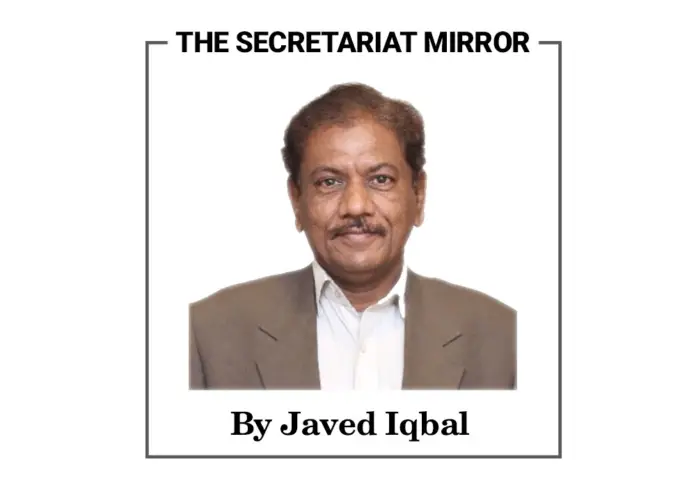Punjab Chief Minister Ch Parvez Elahi in the maiden meeting of administrative secretaries at the Civil Secretariat Lahore the other day agreed that the government writ has weakened to a large extent, due to which mafias were rising everywhere and it had become quite difficult to control them. The biggest everyday impact is overpricing around us.
Ever since the end of the magistracy system in 2001, the rate of encroachment on government lands has increased at an alarming rate. More than two lakh acres of land were occupied, the value of which is estimated at 485 billion rupees. This land also included 4,200 acres of urban land worth around Rs70 billion. Anti-corruption authorities also played a key role in this campaign.
It should be noted that during the reign of General Pervez Musharraf, the executive magistracy was abolished because the aim was to separate the judiciary and the administration. At that time, no one considered how the vacuum would be filled. In the colonial system, such a large population was governed under this system.
Although General Musharraf’s new law delegated powers to the judiciary and the police, the vacuum remained intact till today. Though the local government system tried to fill this gap, later political governments re-concentrated the powers at the centre. Neither the politicians nor the bureaucracy wanted the local government system to prevail because it would provide paraphernalia to the citizens to approach to resolve their issues.
According to the Pakistan Social Sciences Review, more than 2 million cases are pending in the higher and subordinate judiciary. The detail of pending cases in the higher judiciary in 2020 is: Supreme Court 45,508, Lahore High Court 18,411, Sindh High Court 84,341, Peshawar High Court 38,464, Balochistan High Court 5,313, and Islamabad High Court 17,085. Likewise, pending cases in the district courts in 2020 include Punjab 1,287,121, Sindh 105,458, KP 210,025, Balochistan 17,000 and Islamabad 43,924.
According to the World Justice Project’s (WJP) Rule of Law Index 2021 report on Civil Justice, Pakistan was globally ranked 124 out of 139 nations, while in criminal justice it was placed at 108 among the 139 countries. The alarming thing is that the government has no panacea to improve things to ensure speedy justice for the common man.
Now that the Punjab chief minister has also realized that it is impossible to control the mafias without the government writ and the government writ can come only by giving powers and strengthening the field hierarchy, the officers should do summary trials and announce punishments on the spot.
Apart from this, it may be recalled that the Standing Committee on Law and Justice of the National Assembly had also approved giving powers of the magistrate to the Deputy Commissioners on the recommendations of the Council of Common Interest in its 29th meeting.
Shahnawaz, who is a legal expert, when discussed with him on this subject, said that the separation of powers needs to be re-examined. He said that the judicial magistrates usually hear cases in the courts while the crimes are committed in the streets. While illegally occupying government lands, there is no one to ask. The phenomenon of sexual harassment against the former spokesperson of ex-Prime Minister Imran Khan is not very old.
Amir Khan, a retired officer, said, “The irony is that the civil administration, which has to implement government orders, does not have the authority, nor does it have any personnel, nor does the police respond to them.” He said that the government should find a solution to this problem, either by restoring the executive magistracy completely, or establishing a municipal or administrative police force to ensure the implementation of government policies, only then, action against the peddlers and those who encroached upon government lands could be possible. He said that one of the reasons for the tragic incident of Murree was that the officers of other departments were not responsive to the Assistant Commissioner. CS Kamran Ali Afzal had assigned the power to countersign the performance evaluation reports of all officers to DCs to ensure his authority.
It should be noted that the Supreme Court of Pakistan is also hearing a case for the restoration of executive magistracy because the provinces want this system to be restored. The governments want an acceptable solution to change the relevant law. However, the delay factor continues to erode the government writ.
A senior officer of the Home Department said that in 2020, we had given the powers of Special Magistrates to Deputy Commissioners and Assistant Commissioners so that they take action against hoarders, illegal occupants, adulteration mafia, water and electricity thieves, and route permit violations, etc. But this failed because the police did not cooperate with the civil officers.
Asghar Ali advocate said that all the actors of the Criminal Justice System, (CJS) including the judiciary, police and prosecution, should consider that the more powerful the administration, the less the burden of cases on the police and courts. He said that with the abolition of magistrates, any kind of external check on the police has ended, and police stations have become penitentiaries.
Muhammad Shafiq, a retired police officer and a serving DIG were of the view that magistracy, a colonial legacy, was not solution to problems. They said that internal accountability of police ensures a foolproof check on the law enforcement agency. They demanded of the government to increase personnel and funds to control crime.
A District & Sessions judge on anonymity said that JoP powers have paralysed the lower judiciary as 70 % of court time is consumed to hear not registering of FIRs by police. The government should amend relevant law to appoint separate JoP, the judge suggested.
According to the Pakistan Bureau of Statistics, the Ministry of Interior disclosed crime from 2010 to 2020. As per the report, all crimes reported to police were 7585008, of which, 119230 murder cases, 138930 of attempted murder, 210386 kidnappings, 30788 of dacoity, 184937 robberies, 178228 burglaries, 83026 cattle theft, 359200 vehicle theft, other 453024 other theft, and miscellaneous crimes 5917200.
The overall prosecution rate in Pakistan is 8%, South Africa 38%, India 37%, the United Kingdom 90%, USA 85%, and Japan 99%. This is because of poor prosecution and faulty investigation.
Considering the issue in depth, CM Parvez Elahi should consult all the pillars of the CJS including police, prosecution, judiciary, forensic agencies, private counsels, civil society and administration to sort out solutions to fading administrative justice.
The CM should also pay attention to the formation of public safety commissions, consisting of dignitaries, who can have an eye on the police and if possible, they should also be given the powers of Justice of Peace (22-A) of CrPC. If revived the magistrates should have high esteem with tenured posts without fear of transfers and political interference. The government should also give legal protection to arbitrary councils (panchayt) so that the unnecessary burden on the courts can be reduced. Moreover, after the 18th Amendment, the real test is to overhaul the justice system and revive the economy of the province. The rule of law and low pendency in courts will address corruption, political interventions and maladministration in the system. This all will improve the writ of the government to control mafias, ensure good governance, generate investments and create jobs for unemployed youth who otherwise indulge in criminal activities.







